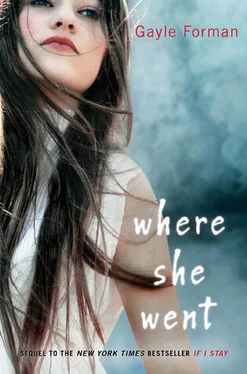“You should quit.”
Her voice jars me. But it also somehow calms me.
I look up. There’s Mia, face flushed, but also, oddly, smiling. She’s breathing hard, like she’s been running.
Maybe she gets chased by fans, too. I imagine that old couple in the tux and pearls tottering after her.
I don’t even have time to feel embarrassed because Mia is here again, standing in front of me like when we still shared the same space and time and bumping into each other, though always a happy coincidence, was nothing unusual, not the slightest bit extraordinary. For a second I think of that line in Casablanca when Bogart says: Of all the gin joints in the world, she has to walk into mine. But then I remind myself that I walked into her gin joint.
Mia covers the final few feet between us slowly, like I’m a cagey cat that needs to be brought in. She eyes the cigarette in my hand. “Since when do you smoke?” she asks. And it’s like the years between us are gone, and Mia has forgotten that she no longer has the right to get on my case.
Even if in this instance it’s deserved. Once upon a time, I’d been adamantly straightedge where nicotine was concerned. “I know. It’s a cliche,” I admit.
She eyes me, the cigarette. “Can I have one?”
“You?” When Mia was like six or something, she’d read some kid’s book about a girl who got her dad to quit smoking and then she’d decided to lobby her mom, an on-again-off-again-smoker, to quit. It had taken Mia months to prevail upon Kat, but prevail she did.
By the time I met them, Kat didn’t smoke at all. Mia’s dad, Denny, puffed on a pipe, but that seemed mostly for show. “You smoke now?” I ask her.
“No,” Mia replies. “But I just had a really intense experience and I’m told cigarettes calm your nerves.”
The intensity of a concert — it sometimes left me pent up and edgy. “I feel that way after shows sometimes,” I say, nodding.
I shake out a cigarette for her; her hand is still trem bling, so I keep missing the tip of the cigarette with my lighter. For a second I imagine grabbing her wrist to hold her steady. But I don’t. I just chase the cigarette until the flame flashes across her eyes and lights the tip.
She inhales and exhales, coughs a little. “I’m not talking about the concert, Adam,” she says before taking another labored drag. “I’m talking about you.”
Little pinpricks fire-cracker up and down my body.
Just calm down, I tell myself. You just make her nervous, showing up all out of the blue like that. Still, I’m flattered that I matter — even if it’s just enough to scare her.
We smoke in silence for a while. And then I hear something gurgle. Mia shakes her head in dismay and looks down at her stomach. “Remember how I used to get before concerts?”
Back in the day, Mia would get too nervous to eat before shows, so afterward she was usually ravenous.
Back then, we’d go eat Mexican food at our favorite joint or hit a diner out on the highway for French fries with gravy and pie — Mia’s dream meal. “How long since your last meal?” I ask.
Mia peers at me again and stubs out her half-smoked cigarette. She shakes her head. “Zankel Hall? I haven’t eaten for days. My stomach was rumbling all through the performance. I was sure even people in the balcony seats could hear it.”
“Nope. Just the cello.”
“That’s a relief. I think.”
We stand there in silence for a second. Her stomach gurgles again. “Fries and pie still the optimal meal?”
I ask. I picture her in a booth back in our place in Oregon, waving her fork around, as she critiqued her own performance.
“Not pie. Not in New York. The diner pies are such disappointments. The fruit’s almost always canned. And marionberry does not exist here. How is it possible that a fruit simply ceases to exist from one coast to another?”
How is it possible that a boyfriend ceases to exist from one day to another? “Couldn’t tell you.”
“But the French fries are good.” She gives me a hopeful half smile.
“I like French fries,” I say. I like French fries? I sound like a slow child in a made-for-TV movie.
Her eyes flutter up to meet mine. “Are you hungry?”
she asks.
Am I ever.
I follow her across Fifty-seventh Street and then down Ninth Avenue. She walks quickly — without even a faint hint of the limp she had when she left — and purposefully, like New Yorkers do, pointing out landmarks here and there like a professional tour guide. It occurs to me I don’t even know if she still lives here or if tonight was just a tour date.
You could just ask her, I tell myself. It’s a normal enough question.
Yeah, but it’s so normal that it’s weird that I have to ask.
Well you’ve got to say something to her.
But just as I’m getting up the nerve, Beethoven’s Ninth starts chiming from her bag. Mia stops her NYC monologue, reaches in for her cell phone, looks at the screen, and winces.
“Bad news?”
She shakes her head and gives a look so pained it has to be practiced. “No. But I have to take this.”
She flips open the phone. “Hello. I know. Please calm down. I know. Look, can you just hold on one second?”
She turns to me, her voice all smooth and professional now. “I know this is unbearably rude, but can you just give me five minutes?”
I get it. She just played a big show. She’s got people calling. But even so, and in spite of the mask of apology she’s wearing, I feel like a groupie being asked to wait in the back of the bus until the rock star’s ready. But like the groupies always do, I acquiesce. The rock star is Mia. What else am I gonna do?
“Thank you,” she says.
I let Mia walk a few paces ahead of me, to give her some privacy, but I still catch snippets of her end of the conversation. I know it was important to you. To us. I promise I’ll make it up to everyone. She doesn’t mention me once.
In fact she seems to have forgotten about me back here entirely.
Which would be okay except that she’s also oblivious to the commotion that my presence is creating along Ninth Avenue, which is full of bars and people loitering and smoking in front of them. People who double take as they recognize me, and yank out their cell phones and digital cameras to snap pictures.
I vaguely wonder if any of the shots will make it onto Gabber or one of the tabloids. It would be a dream for Vanessa LeGrande. And a nightmare with Bryn. Bryn is jealous enough of Mia as it is, even though she’s never met her; she only knows about her. Even though she knows I haven’t seen Mia in years, Bryn still complains:
“It’s hard competing with a ghost.” As if Bryn Shraeder has to compete with anyone.
“Adam? Adam Wilde?” It’s a real paparazzo with a telephoto lens about a half block away. “Yo, Adam. Can we get a shot? Just one shot,” he calls.
Sometimes that works. Give them one minute of your face and they leave. But more often than not, it’s like killing one bee and inviting the swarm’s wrath.
“Yo, Adam. Where’s Bryn?”
I put on my glasses, speed up, though it’s too late for that. I stop walking and step out on to Ninth Avenue, which is clogged with taxis. Mia just keeps walking down the block, yapping away into her cell phone. The old Mia hated cell phones, hated people who talked on them in public, who dismissed one person’s company to take a phone call from someone else. The old Mia would never have uttered the phrase unbearably rude.
I wonder if I should let her keep going. The thought of just jumping into a cab and being back at my hotel by the time she figures out I’m not behind her anymore gives me a certain gritty satisfaction. Let her do the wondering for a change.
Читать дальше












